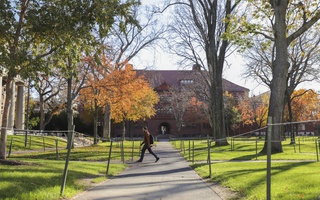{shortcode-b40137a984fc67838f1f7be206865fb2fe5e4b63}
Though Harvard first announced its sanctions policy three years ago, the College has not yet decided whether to subject some student groups — including House Committees — to the penalties.
Associate Dean of Student Engagement Alexander R. Miller said in an interview Tuesday that the Dean of Students Office has only been “clear” about the sanctions’ effects on student organization leaders and pre-orientation program leaders.
The sanctions — which took effect with the Class of 2021 — prohibit members of single-gender final clubs and Greek organizations from captaining varsity athletic teams, holding leadership positions in campus student organizations, and receiving College endorsement for prestigious fellowships.
Miller said Tuesday that the College has “not had a conversation” about whether the sanctions apply to House Committee chairs and that the issue is “not on [his] radar.”
“On first impulse, House Committees are elected by the house communities,” Associate Dean of Students Lauren E. Brandt ’01 said Tuesday. “So I think there's that piece of the process, that we want to be careful about in terms of this.”
Many student organizations that are subject to the sanctions elect their leaders.
DSO administrators confirmed Tuesday that Peer Advising Fellows and pre-orientation program leaders are not subject to the sanctions. But the policy does apply to pre-orientation directors — like members of the Freshman Outdoor Program steering committee — and Eagle PAFs, who serve as student leaders of the PAF program.
PAFs are upperclassmen chosen by the College to advise freshmen. Similarly, pre-orientation program leaders guide freshmen during the week leading up to move-in day.
Kate Colleran, who serves as assistant dean of student engagement and leadership in the DSO, wrote in an emailed statement that the guidelines for pre-orientation programs is consistent with the rest of the sanctions policy, and that administrators and students are aware of these guidelines.
“Having sanctions apply only to the steering committees of the Pre-Orientation programs is in line with the practice for all other student organizations regarding sanctions. (With ISOs, for example, it would be officers or executive board as detailed in the groups' constitutions.) The Pre-O directors have been informed of this and will be working within their groups to be in line with the policy,” Colleran wrote.
Miller said Tuesday that students should consult administrative bodies like the Office of Undergraduate Education if they have questions about whether the social group penalties apply to a specific program.
“I would invite them to go to their supervisors who manage them on a regular basis to figure out because these are expectations that should be communicated as part of their employment,” Miller said.
—Staff writer Sanjana L. Narayanan can be reached at sanjana.narayanan@thecrimson.com.
















